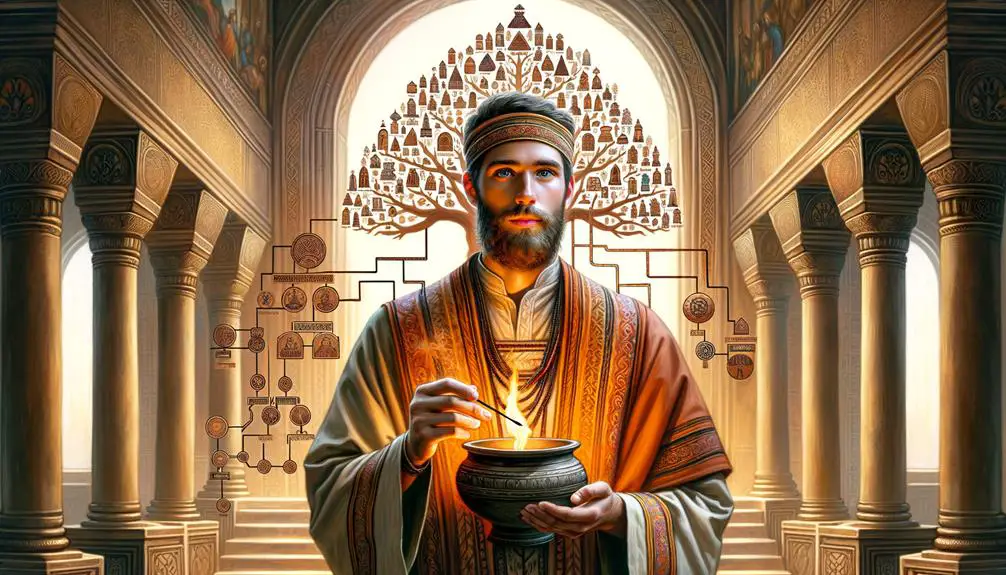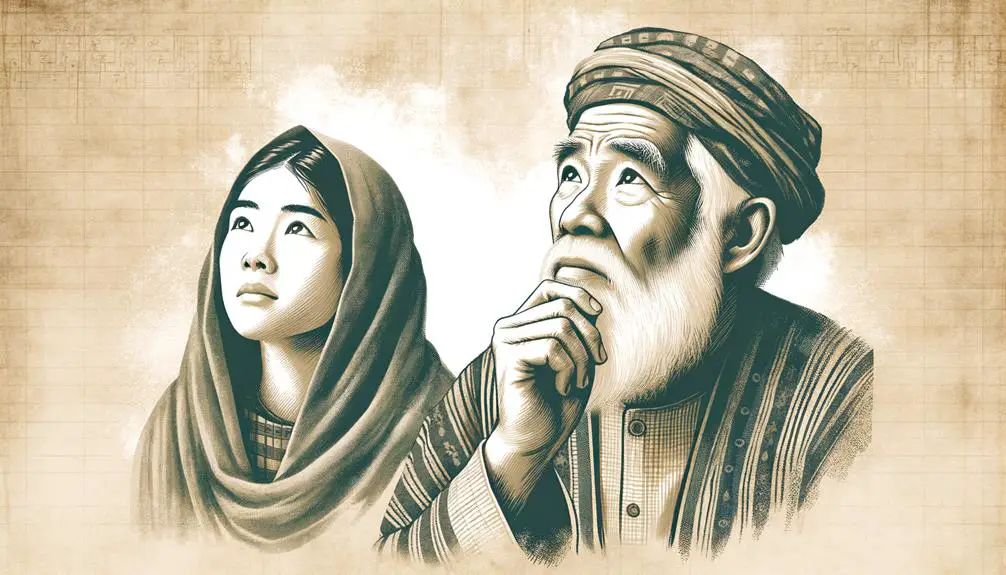Discover how Zachariah, Elizabeth's husband, transitions from disbelief to faith, playing a crucial role in biblical prophecy.

Who Was Elizabeth's Husband in the Bible
Just as every lock has its key, Elizabeth's story in the Bible finds its counterpart in her husband, Zachariah. You might know him as a devout priest from the lineage of Abijah, whose life takes a dramatic turn following an angelic visitation.
The narrative surrounding Zachariah is not just about his priestly duties; it encapsulates doubt, silence, and ultimately, divine fulfillment. But who was Zachariah beyond his moment of disbelief? His journey from doubt to faith and his role in the advent of a prophecy that would change the course of history beckons for a closer look.
Why is his story, intertwined with Elizabeth's, pivotal in understanding the broader biblical narrative?
Key Takeaways
- Elizabeth's husband, Zachariah, was a distinguished priest from a notable priestly lineage.
- He experienced divine punishment of imposed silence due to his initial doubt about Gabriel's announcement.
- Zachariah's transformation and faith were deepened during his period of silence.
- The birth of their son, John the Baptist, was a significant event foretold by the Angel Gabriel.
Zachariah's Priestly Lineage

Zachariah, Elizabeth's husband, hailed from a distinguished priestly lineage, deeply rooted in the traditions and ceremonies of Jewish worship. Being part of this lineage meant that he wasn't just familiar with the intricacies of Temple rituals; he was an active participant, bearing the weighty responsibility of performing Levitical duties that were crucial to the spiritual life of his community.
You must understand that in Zachariah's time, the Temple in Jerusalem was the heart of Jewish religious life. Its rituals and ceremonies were designed to bridge the gap between the divine and the human, allowing for atonement, celebration, and worship. As a priest, Zachariah's role wasn't merely ceremonial; it was vital. He facilitated these connections through his service, engaging in a variety of tasks ranging from the offering of sacrifices to the teaching of the Torah.
His Levitical duties, therefore, weren't just a matter of religious obligation but a calling that demanded deep knowledge, unwavering faith, and meticulous attention to detail. These tasks, governed by a complex set of laws and traditions, required not only physical purity but a profound spiritual integrity. Zachariah's participation in these rituals wasn't just a testament to his personal faith; it reflected the continuity of a tradition that stretched back generations, encapsulating the essence of his priestly lineage.
In analyzing Zachariah's life and service, it's clear that his identity was deeply intertwined with the performance of these sacred duties. His commitment to fulfilling these roles underscored the pivotal position he held within his community, serving as a bridge between the past and the present, the earthly and the divine.
Marriage to Elizabeth
Reflecting on his role within the community, it's essential to consider how Zachariah's marriage to Elizabeth further anchored his personal and spiritual commitments. Their union, deeply rooted in mutual respect and adherence to cultural norms, exemplifies the foundational aspects of marital fidelity and religious observance. Elizabeth's fidelity not only underscores her personal virtue but also reflects the societal expectations of women during that era. This relationship, steeped in commitment and faith, offers a profound insight into the dynamics of marriage within their cultural and historical context.
Here are three key aspects of Zachariah and Elizabeth's marriage:
- Grounded in Faith: Their marriage wasn't just a social contract but a spiritual covenant. Both Zachariah and Elizabeth shared a deep commitment to their faith, guiding them through life's challenges and their shared longing for a child. This spiritual bond underscored every aspect of their life together, making their relationship a testament to their unwavering faith.
- Adherence to Cultural Norms: Living in a time when cultural norms dictated much of daily life, their marriage was a reflection of these expectations. Elizabeth's fidelity, in particular, was a critical aspect of their union, showcasing the importance of virtue and commitment within their community.
- Mutual Respect and Support: Despite the challenges they faced, including the burden of childlessness, Zachariah and Elizabeth's relationship was marked by mutual respect and support. Their enduring love and companionship served as a foundation for their resilience and faith, ultimately playing a pivotal role in their story.
Analyzing Zachariah's marriage to Elizabeth allows us to appreciate the intricate interplay between personal faith, cultural norms, and the enduring strength of marital commitment.
The Angel's Promise

You're now entering a pivotal moment in the biblical narrative, where the Angel Gabriel's announcement sets the stage for a series of miraculous events.
Elizabeth's unexpected pregnancy, despite her advanced age, fulfills a divine promise, showcasing a pivotal moment of faith and divine intervention.
Zechariah's initial doubt, met with his temporary muteness, underscores the complexity of human faith when confronted with divine will, inviting you to reflect on the interplay between doubt and belief.
Angel Gabriel's Announcement
When the Angel Gabriel appeared to Mary, he delivered a promise that would forever alter the course of history, foretelling the birth of Jesus Christ and subtly intertwining Mary's fate with Elizabeth's. Gabriel's purpose in this divine intervention was clear:
- To Announce the Coming of the Messiah: Gabriel informed Mary about her pivotal role in the birth of Jesus, signifying the fulfillment of prophecies.
- To Reveal God's Plan: The announcement showed how meticulously God's plans were laid, encompassing the lives of Mary and Elizabeth in a divine tapestry.
- To Strengthen Faith: This moment was a testament to the power of faith, as Mary's acceptance marked a cornerstone in the unfolding of salvation history.
Gabriel's announcement was a cornerstone of faith, intertwining destinies through divine will.
Elizabeth's Miraculous Pregnancy
Parallel to Mary's divine encounter, Elizabeth's miraculous pregnancy, as foretold by the Angel Gabriel, marked another pivotal moment in the narrative of salvation history. Despite the age factor, she conceived, defying natural expectations and societal norms. This event not only challenged cultural reactions but also emphasized divine intervention in human affairs.
Aspect |
Impact |
|---|---|
Age Factor |
Showed divine power over natural law. |
Cultural Reaction |
Altered perceptions of Elizabeth's status. |
Divine Intervention |
Reinforced faith in God's promises. |
Societal Norms |
Challenged and reshaped community views. |
Elizabeth's story is a testament to faith and the belief in the impossible, showcasing that age and societal norms are no barrier to divine plans and miracles.
Zechariah's Muted Doubt
Often, even the most faithful can harbor doubts, as was the case with Zechariah upon hearing the angel Gabriel's promise of a son. His reaction, rather than being openly dismissive, was one of muted disbelief. This incident beautifully illustrates several key points:
- Muted reactions aren't always indicative of a lack of faith, but rather a human struggle to comprehend the divine.
- Doubt's consequences in Zechariah's case were both immediate and instructive, leading to his temporary muteness.
- This episode serves as a reminder that divine promises challenge us to trust beyond our understanding.
In analyzing Zechariah's response, it's evident that even the most devout individuals can experience moments of uncertainty, which, rather than diminishing their faith, can ultimately serve to strengthen it.
Zachariah's Doubt and Silence

Faced with the divine announcement of his wife Elizabeth's pregnancy, Zachariah's skepticism led to his imposed silence by an angel, serving as a profound lesson on faith and obedience. This moment in biblical history underscores the significance of belief in the face of the implausible, showing that divine punishment can come in unexpected forms but also pave the way for faith restoration.
Zachariah, a righteous and devout man, found himself at a crossroads of faith when confronted with the angel Gabriel's message. His doubt wasn't just a personal falter; it was a breach of trust in God's power, warranting divine punishment. Yet, this punishment wasn't merely punitive. The imposed silence wasn't just a penalty but a period for reflection, an invitation to internalize the gravity of divine intervention without the distraction of speech.
Throughout his enforced silence, Zachariah's faith underwent a transformation. Deprived of his voice, he'd no choice but to listen and observe, witnessing the unfolding of God's promise. This period of muteness served as a cocoon for faith restoration, allowing Zachariah to emerge with a renewed belief in God's omnipotence and a deeper understanding of obedience.
Zachariah's experience serves as a testament to the complexities of faith. It's a reminder that doubt can lead to divine punishment but also offers a unique opportunity for spiritual growth and enlightenment. His journey from skepticism to belief underscores the importance of trusting in the unseen, emphasizing that faith restoration often follows moments of profound questioning and silence.
The Birth of John the Baptist
You must consider how Zechariah's imposed silence, a direct consequence of his doubt, uniquely positions him during the angelic announcement of John the Baptist's forthcoming birth.
This silence isn't merely punitive; it serves as a reflective period that underscores the gravity and certainty of divine promises.
The impact of the angelic message, therefore, isn't just on Zechariah and Elizabeth but also foreshadows the pivotal role their son will play in salvation history.
Zechariah's Silent Vow
In the biblical narrative, Zechariah's encounter with the angel Gabriel led to a remarkable period of silence, imposed as a consequence of his disbelief in the foretold birth of his son, John the Baptist. This silence wasn't merely punitive; it served several profound purposes:
- Silent Communication: It forced Zechariah to find alternative ways to communicate, deepening his introspection and understanding of divine will.
- Reflection and Growth: The imposed silence allowed Zechariah time to reflect on his doubts and grow in faith, preparing him for his son's significant role.
- Vow Fulfillment: Zechariah's eventual speech restoration symbolized the fulfillment of his vow and the divine promise, underlining the power of faith and obedience.
This period of silence underscores the importance of belief and the consequences of doubt, offering a unique perspective on divine interaction and human response.
Angelic Announcement Impact
The angelic announcement of John the Baptist's impending birth profoundly impacted Zechariah and Elizabeth's lives, illustrating the intersection of divine intervention and human faith. This moment wasn't merely a personal milestone; it was a pivotal event with significant social repercussions.
Divine intervention, in this context, served as a testament to the power and will of a higher force, guiding and shaping human destiny. Yet, the implications stretched beyond the miraculous conception. The societal perception of Elizabeth and Zechariah, once marred by their childlessness, was transformed, underscoring how divine acts can reverberate through the social fabric, altering status and perceptions.
Their story is a compelling narrative of faith's role in navigating the challenges and expectations of their time, framed by the profound impact of divine intervention.
Role in Biblical Prophecy

Elizabeth's husband, Zechariah, plays a pivotal role in biblical prophecy, signaling the advent of significant religious figures and events. His story isn't just a footnote; it's a masterful example of divine orchestration and prophetic implications that are crucial for understanding the broader narrative of salvation history.
Here are three key aspects of Zechariah's role in biblical prophecy:
- Foretelling John the Baptist's Birth: Zechariah's encounter with the angel Gabriel isn't merely awe-inspiring; it's a divine announcement that positions his son, John the Baptist, as the precursor to Jesus Christ. This event underscores the meticulous planning involved in the fulfillment of God's promises.
- Silence as a Prophetic Sign: Zechariah's temporary inability to speak until his son's birth serves as a symbolic act, emphasizing the importance of belief in God's word. This silence can be seen as a reflective period, where Zechariah's faith and understanding deepened, preparing him to fully embrace his role in God's plan.
- Benedictus and Messianic Expectations: Upon regaining his speech, Zechariah's prophetic hymn, the Benedictus, not only praises God for the imminent redemption of Israel but also highlights the pivotal role his son will play in preparing the way for the Messiah. This emphasizes the interconnectedness of divine plans and human history.
Zechariah's story teaches you about the depth of faith and the complexity of prophecy. It's a testament to how individual lives are woven into the grand tapestry of divine prophecy, each playing a distinct role in the unfolding of God's redemptive plans.
Legacy and Significance
Understanding Zechariah's legacy and its significance, you'll find that his life's story goes beyond personal faith, shaping the very foundation of Christian beliefs and traditions. As you delve deeper, you'll appreciate how his experiences and actions, chronicled in the Bible, offer profound insights into the cultural implications of his time and the historical context in which he lived.
Zechariah's role as a priest, coupled with the miraculous birth of his son, John the Baptist, underlines the intersection of divine intervention and human obedience in biblical narratives. This not only highlights the importance of faith and trust in God's plans but also illustrates the cultural significance of lineage and prophecy in ancient Jewish society. His story, therefore, serves as a pivotal link between Old Testament prophecies and the New Testament's fulfillment of those prophecies, bridging cultural and religious expectations of the Messiah's coming.
Moreover, Zechariah's silence until John's birth speaks volumes about the power of words and the significance of naming in his culture. This period of reflection and eventual vocalization underscores the transformative power of faith and obedience, which are core principles in Christian teachings.
In analyzing Zechariah's legacy, it's clear that his life and the events surrounding it are imbued with layers of meaning that resonate beyond the historical context. They offer a lens through which to view the intricate tapestry of cultural, religious, and personal transformation that's central to understanding Christian traditions and beliefs. Through Zechariah's story, you're invited to reflect on the enduring impact of faith, obedience, and prophecy in shaping not only individual lives but also the collective identity of believers.
Frequently Asked Questions
How Did Elizabeth's Relationship With Mary, the Mother of Jesus, Influence the Early Christian Community?
Elizabeth's relationship with Mary, marked by divine intervention and a deep cousinly bond, significantly influenced the early Christian community. Their connection showcased the role of women in God's plan, reinforcing faith in divine purposes.
This relationship, rooted in mutual support and prophetic acknowledgment, offered a model of faith and obedience. It emphasized the importance of community and collective faith, shaping the foundational attitudes and values of early Christian followers.
Are There Any Traditions or Non-Biblical Texts That Provide More Insight Into Elizabeth's Personal Life and Character?
Ever wondered about Elizabeth's life beyond the Bible? Indeed, various traditions and non-biblical texts shed light on her lineage and character. These sources delve into her background, emphasizing her connection to priestly duties through her family.
They provide a richer understanding of her personal virtues and her role in the early Christian community. While not canon, these insights offer a more detailed glimpse into Elizabeth's profound influence and esteemed lineage.
How Has Elizabeth's Story Been Depicted in Art, Literature, and Music Throughout History?
Elizabeth's story has been immortalized in various forms of art, literature, and music over centuries. You'll find her narrative woven into countless artistic interpretations, each adding depth to her character.
Musical compositions have also played a pivotal role in bringing her tale to life, offering a unique auditory experience.
These creative expressions delve into her persona, showcasing her significance in a respectful and detailed manner, enriching our understanding of her historical and cultural impact.
What Are the Differences in the Portrayal of Elizabeth and Her Husband in Various Christian Denominations?
As the saying goes, 'Different strokes for different folks,' denominational rituals and theological interpretations greatly influence how Elizabeth and her husband are portrayed across Christian sects.
You'll find that these differences aren't just superficial but dive deep into the fabric of faith, reflecting varying emphases on aspects of their story.
Each denomination's unique perspective offers a rich, detailed tapestry of belief, showing respect and reverence for these biblical figures in diverse, meaningful ways.
How Do Modern Archaeological Findings Support or Contradict the Historical Accounts of Elizabeth and Her Family in the Bible?
You're diving into how archaeological methods shed light on the historical accounts of a biblical family.
Interestingly, findings related to Zechariah's occupation as a priest align with historical practices of the time, offering support to these accounts.
However, contradictions arise when evidence doesn't neatly match with every detail mentioned in the scriptures.
Your analysis should respect the complexities of interpreting ancient texts alongside modern archaeological discoveries, highlighting the ongoing dialogue between faith and science.
Conclusion
In the tapestry of biblical narratives, Zachariah and Elizabeth's story stands out as a vibrant thread, symbolizing faith and divine intervention.
You've seen how Zachariah's initial doubt, transformed by an angel's promise, led to silence, ultimately weaving into the joyous birth of John the Baptist.
Their journey underlines the power of belief and the pivotal role they played in setting the stage for prophetic fulfillment.
Their legacy, deeply rooted in faith, continues to inspire and resonate, highlighting their significant place within the broader biblical prophecy.



Sign up